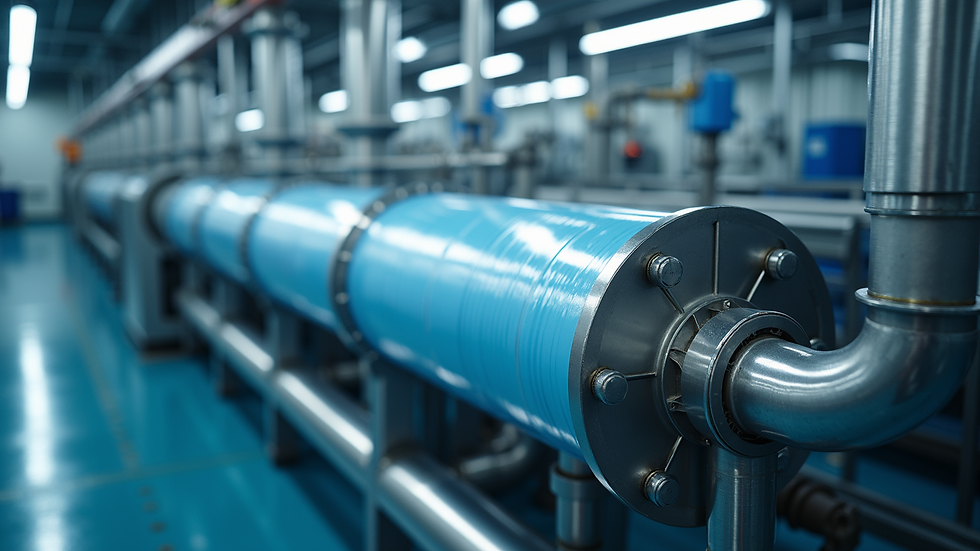Optimizing Industrial Wastewater Management in India
- palwinder kaur
- Aug 22, 2025
- 4 min read
Industrial growth in India has been rapid, contributing significantly to the economy. However, this growth has also led to increased wastewater generation, posing serious environmental and health challenges. Efficient wastewater treatment strategies are essential to mitigate these impacts and promote sustainable industrial development. This article explores practical approaches to optimizing industrial wastewater management in India, focusing on innovative treatment methods, regulatory frameworks, and technological advancements.
Understanding Wastewater Treatment Strategies in Industrial Settings
Wastewater treatment strategies are designed to remove contaminants from industrial effluents before they are discharged into the environment. These strategies vary depending on the type of industry, the nature of pollutants, and local regulations. In India, industries such as textiles, chemicals, pharmaceuticals, and food processing generate large volumes of wastewater containing hazardous substances.
Effective treatment strategies typically involve a combination of physical, chemical, and biological processes:
Physical Treatment: Includes screening, sedimentation, and filtration to remove suspended solids.
Chemical Treatment: Involves coagulation, flocculation, and neutralization to eliminate dissolved pollutants.
Biological Treatment: Uses microorganisms to degrade organic matter in the wastewater.
Adopting a multi-stage treatment approach ensures higher efficiency and compliance with environmental standards. For example, textile industries often use activated sludge processes combined with chemical coagulation to treat dye-laden wastewater effectively.

Caption: Aeration tanks in an industrial wastewater treatment plant help reduce organic pollutants.
What do you mean by industrial waste management?
Industrial waste management refers to the systematic control of waste materials produced by industrial activities. It encompasses the collection, treatment, recycling, and disposal of waste to minimize environmental impact. Proper management of industrial waste is crucial for protecting water bodies, soil, and air quality.
In the context of wastewater, industrial waste management involves treating effluents to remove harmful substances before releasing them into the environment. This process not only safeguards ecosystems but also helps industries comply with legal requirements and avoid penalties.
Key components of industrial waste management include:
Waste Characterization: Identifying the types and quantities of waste generated.
Waste Minimization: Implementing processes to reduce waste production at the source.
Treatment Technologies: Applying suitable methods to detoxify or recycle waste.
Safe Disposal: Ensuring that residual waste is disposed of in an environmentally sound manner.
For instance, chemical manufacturing units may implement solvent recovery systems to reduce hazardous waste generation, while food processing plants might use anaerobic digestion to treat organic wastewater.

Caption: Storage tanks at a chemical plant used for managing industrial waste before treatment.
Challenges in Industrial Wastewater Management in India
Despite advancements, India faces several challenges in managing industrial wastewater effectively:
Inadequate Infrastructure: Many industries lack access to modern treatment facilities, leading to untreated discharge.
Regulatory Compliance: Enforcement of environmental laws is inconsistent, and some industries operate without proper permits.
High Treatment Costs: Small and medium enterprises often find it difficult to invest in advanced treatment technologies.
Pollution Load: The diversity and volume of pollutants make treatment complex and resource-intensive.
Water Scarcity: Reusing treated wastewater is essential but underutilized due to quality concerns and lack of awareness.
Addressing these challenges requires coordinated efforts from government agencies, industry stakeholders, and technology providers. Public-private partnerships can facilitate the development of common effluent treatment plants (CETPs) that serve multiple industries, reducing costs and improving efficiency.
Innovative Technologies for Enhancing Wastewater Treatment
Emerging technologies offer promising solutions to optimize wastewater treatment in Indian industries. Some of these include:
Membrane Filtration: Techniques like ultrafiltration and reverse osmosis provide high-quality effluent by removing fine particles and dissolved salts.
Advanced Oxidation Processes (AOPs): Use of ozone, UV light, or hydrogen peroxide to degrade complex organic pollutants.
Bioaugmentation: Introducing specialized microbial strains to enhance biodegradation of toxic compounds.
Zero Liquid Discharge (ZLD): Systems designed to recycle all wastewater, leaving no liquid waste for discharge.
Automation and Monitoring: Real-time sensors and control systems improve process efficiency and compliance.
For example, the adoption of ZLD systems in textile and dyeing industries has significantly reduced water consumption and pollutant discharge. Similarly, membrane bioreactors combine biological treatment with membrane filtration to achieve superior effluent quality.

Caption: Membrane filtration system used for advanced treatment of industrial wastewater.
Best Practices for Sustainable Industrial Wastewater Management
To optimize wastewater treatment and promote sustainability, industries should consider the following best practices:
Conduct Regular Audits: Assess wastewater characteristics and treatment performance frequently.
Implement Source Control: Reduce pollutant load by modifying production processes and using eco-friendly raw materials.
Invest in Training: Equip staff with knowledge on wastewater management and environmental compliance.
Promote Water Reuse: Treat and reuse wastewater for non-potable applications like cooling and irrigation.
Collaborate with Experts: Partner with technology providers and environmental consultants for customized solutions.
Stay Updated on Regulations: Keep abreast of changes in environmental laws and standards.
By integrating these practices, industries can reduce operational costs, minimize environmental impact, and enhance corporate social responsibility.
Moving Forward with Industrial Wastewater Management in India
Optimizing industrial wastewater management in India is critical for sustainable industrial growth and environmental protection. With increasing regulatory pressure and resource constraints, industries must adopt innovative treatment strategies and best practices. Collaborative efforts between government, industry, and technology providers will pave the way for cleaner water bodies and healthier communities.
Investing in modern treatment technologies, enhancing regulatory compliance, and promoting awareness are key steps toward achieving efficient wastewater management. As India continues to industrialize, prioritizing wastewater treatment will ensure that economic progress does not come at the cost of environmental degradation.



Comments